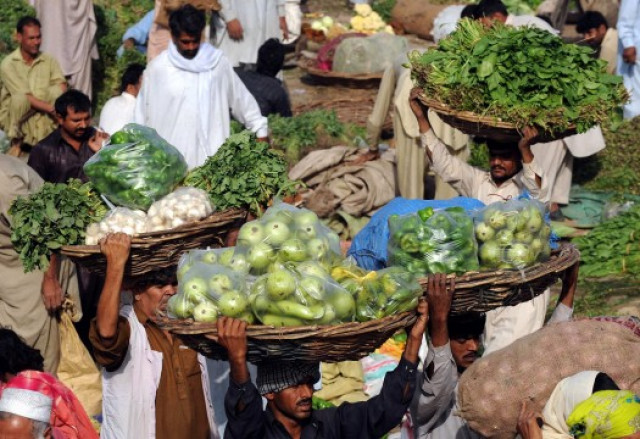Municipal officers differ on why a ban is desirable
TMOs across Lahore continue to grapple with the idea of banning women as vendors in Sunday Bazaars.

The actual implementation of the order, for which Cheema had not given a reason for, still seems distant. In the Sunday Bazaars set up at Ravi Town and Iqbal Town, among others, female vendors were seen selling as usual without any opposition by the local market committee representatives.
The TMO for Ravi Town, Ahmad Kamal told The Express Tribune, “The ban will be imposed because it can be awkward for some to see women as vendors at the Sunday Bazaars.”
Kamal said that the women would be banned in phases within the next couple of weeks. He also said that they would phase out women vendors in order to make sure that the vendors and consumers were not disheartened by the sudden change.
Arif Chaudhary, the Allama Iqbal Town TMO, said that it would be hard to implement such a drastic measure because the women would make it hard for the market committees to enforce the ban. “They argue a lot and fight,” Chauhary said. When asked the reason behind the ban, he said that the main complaint against women selling at Sunday Bazaars was that they sold poor quality commodities.
However, the Shalimar TMO, Haris Jaila, disagreed with Chaudhary’s assumption. “The issue with women vendors is that they are hard to manage. Many of them have ‘gypsy-like tendencies’,” he said. When asked what the phrase meant, he said that the women did not obey market rules. Jaila was the only one among the TMOs contacted by the Tribune who said that the Sunday Bazaars in his area had started implementing the DCO’s orders.
One shopper at the Ravi Town Sunday Bazaar wished the prices at the bazaars were lower. “The Sunday Bazaar only provides a Re1 to Rs3 rebate for us. That is not much if you think about it,” she said.
Chaudhary said that the woman’s grievance was a common one. “High prices is the shoppers’ major complaint which can only be solved if the growers sell their commodities at the Sunday Bazaar.” The TMO added that the middlemen currently involved in the cycle mean higher prices. He also said that factories should set-up stalls at Sunday Bazaars to ensure lower prices.
Addressing this issue, Kamal said that he was consulting with market committees in order to convince the growers to sell directly to the consumers. He said that the current system allowed the middle man to make a lot of money. This translates into higher prices for the consumers. “An initiative that would allow growers to sell directly to the consumers would also mean fresh fruits and vegetables,” he said.
Chaudhary also said that the prices were higher because of the floods. According to Chaudhary, the harvest of vegetables especially potatoes and green peppers had been adversely impacted by the floods. Jaila said that certain fruits, which were grown in Swat, are now harder to find. “The yield from the fields in flood affected areas was wiped out.
Now those commodities have become scarce and more expensive,” he said. Kamal, however, differed saying that the factor had been relevant a couple months ago “but now the bazaars have dealt with the impact of the floods.”
Market committee members, when contacted, said that their job was limited to ensuring that the rates fixed by the government were respected. “We are not responsible for fixing prices,” one member said.
Published in The Express Tribune, November 1st, 2010.



















COMMENTS
Comments are moderated and generally will be posted if they are on-topic and not abusive.
For more information, please see our Comments FAQ